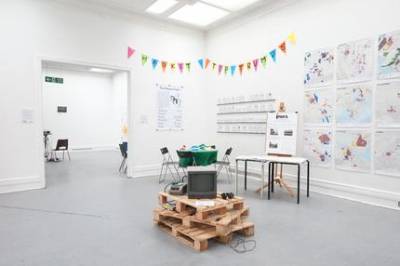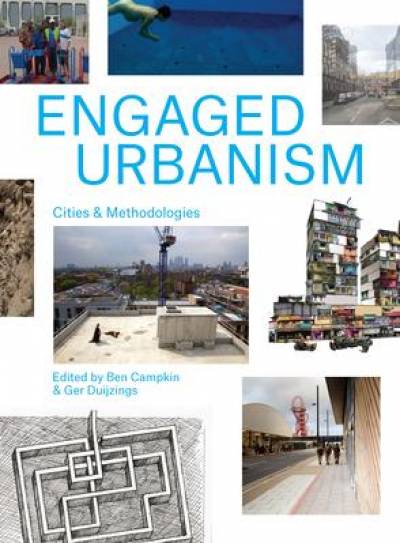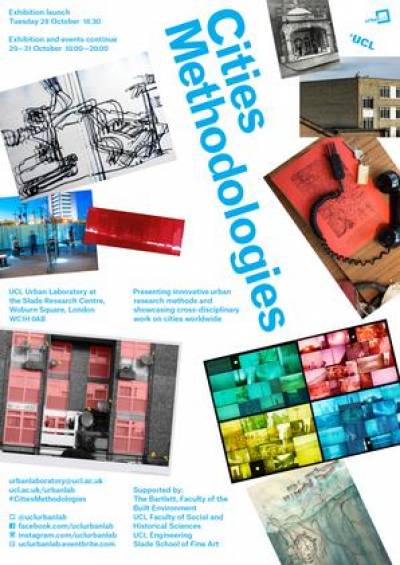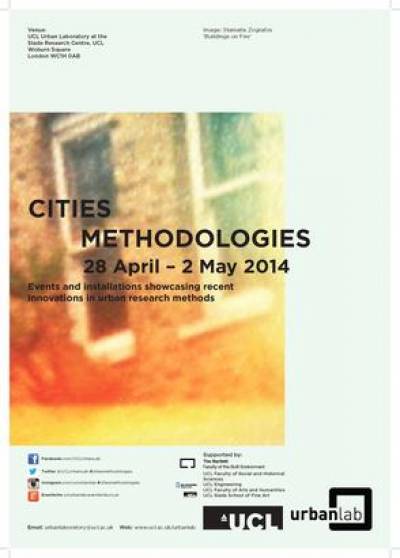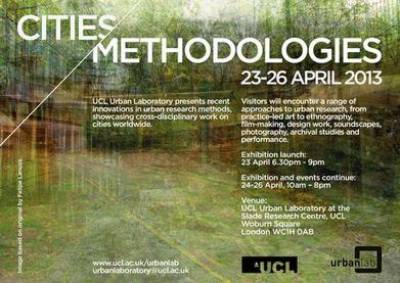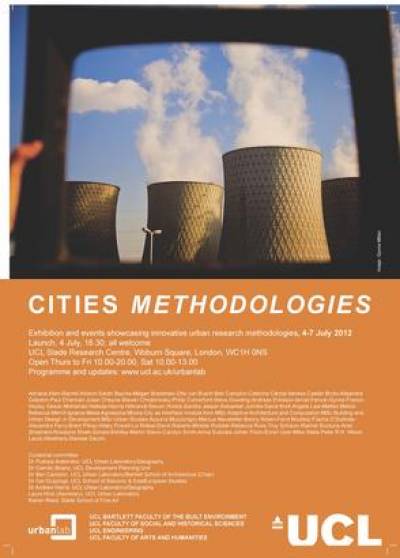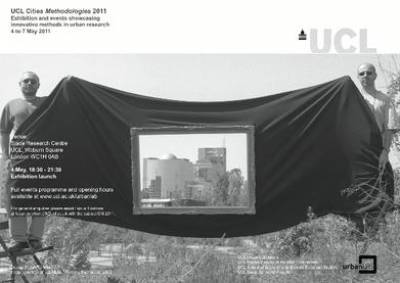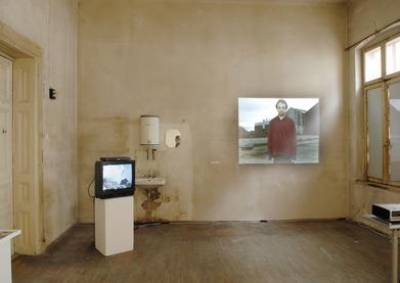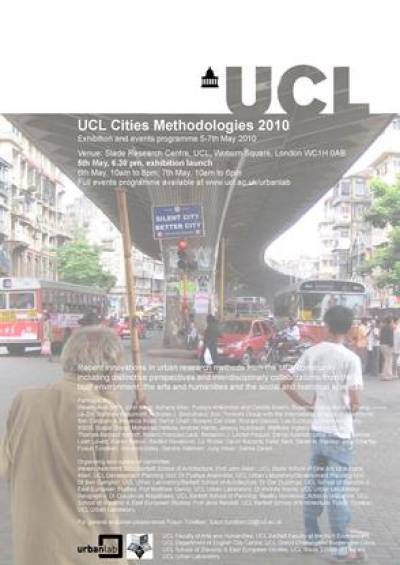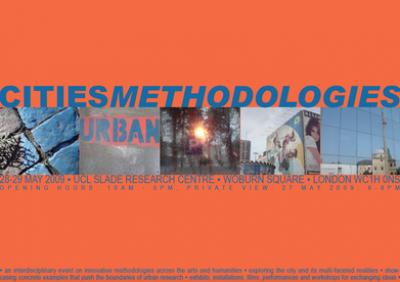Cities Methodologies is an annual exhibition and programme of events showcasing innovative urban research methodologies
Inaugurated in 2009, visitors encounter diverse methods of urban research in juxtaposition - from archival studies to digital media experiments, practice-led art, architectural and design work to film-making, soundscapes, games and public sculpture. Through peer-reviewed exhibits and events, Cities Methodologies showcases this range of innovative urban research methods, from across UCL and the wider urban research community.
The programme aims to think and act collaboratively across the traditional silos of urban knowledge: activists alongside academics, artists alongside social scientists. There is an irreverence towards conventional hierarchies in Cities Methodologies, and that also includes academic hierarchies. This allows younger, emerging generations of urbanists to come forward, and as the exhibitions show, they display great energy and flexibility as transdisciplinary thinkers and actors that should inspire us to rethink traditional academic and professional structures.
A marketplace of global urbanism, recent editions have featured work on cites such as Detroit, Paris, London, Johannesburg, Mumbai and Beirut. Previous shows have also travelled further afield, most recently to Bucharest in 2010.
In 2016 an edited collection was released by I.B. Tauris, Engaged Urbanism: Cities and Methodologies.
- Engaged Urbanism: Cities and Methodologies (2016)
An edited anthology stemming out of the Cities Methodologies exhibition programme is published in 2016 on I.B. Tauris.
Engaged Urbanism: Cities and Methodologies, edited by Ben Campkin and Ger Duijzings, represents just a small selection of some of the many excellent contributions to Cities Methodologies over the years. Keen to represent something of the geographical, intellectual and methodological scope of the programme, the publication poses the question: how can we understand the variety and dynamism of contemporary cities and urban experience across the globe?
In this handbook of collaborative and experimental research practices, over forty urbanists - all contributors to the Cities Methodologies programme - provide succinct, frank and carefully illustrated commentaries on the trials and successes of risk-taking research. They reveal how they collaborate across fields of expertise, inventing or adapting methods to bespoke situations and common challenges. At once theorists, artists, designers, or activists, what binds them is a commitment to better, fairer, cities.
The book was published on 1 December 2016 and was launched in London at the Free Word Centre on 9 December 2016.
Endorsments and reviews:
"In the juggernaut knowledge industry, too little attention is paid to what knowledge really does. Engaged Urbanism provides a wide canvas of what actually does and could take place in urban spaces and provides creative methodological tools for supporting these actions, drawing out unanticipated, neglected and suppressed resources from even the most mundane, opaque or desperate places. In putting all our sensory capacities to work, it offers evidence of the efficacy of methodological invention and demonstrates the possibilities researchers, activists, service providers, and policymakers everywhere have available to deepen their understandings of urban life and to work creatively with what is available to them."
- Professor AbdouMaliq Simone, author of City Life from Jakarta to Dakar.
"Engaged Urbanism demonstrates an array of creative and critical responses to the urban. It asks questions of authorship and expertise, asking who gets to write research agendas and challenging the academic text as a form of 'situated knowledge'. It goes beyond criticism too in offering concrete methodological examples of alternative ways of approaching research and expanding the boundaries of urban knowledge."
- LSE Review of Books, 3 April 2017.
Contributors:
Jennifer Robinson Cities methodologies matter: comparative urbanism and global urban theory Matthew Gandy Methods, metaphors and the interdisciplinary terrain of urban research Jane Rendell with Povilas Marozas, Adriana Keramida, Mrinal Rammohan Site-writing Camillo Boano, Caroline Newton and Giorgio Talocci Towards an architecture of engagement: researching contested urbanism and informalities Suzanne Hall and Juliet Davis 'Worlding' the studio: methodological experiments and the art of being social David Roberts From 'heroin' to heroines Felipe Lanuza Rilling Four palimpsests on the erasure of the Heygate Estate Kate Crawford with Sarah Bell, Felicity Davies, Charlotte Johnson, Sunyoung Joo, Sharon Hayward and Richard Lee Hacking London's demolition decisions: a new collaboration to scrutinise the technical justifications for retrofit, refurbishment and demolition Rebecca Ross and Chi Nguyen Authoring the neighbourhood in Wikipedia Henrietta Williams The secret security guard: being a G4S employee during the London Olympic Games 2012 Max Colson Hide and seek: the dubious nature of plant life in high-security spaces Andrew Harris The ups and downs of visualising contemporary Mumbai Bernadette Devilat Creating systematic records through time: the destruction and reconstruction of heritage areas affected by earthquakes in Chile Sabina Andron Paint. Buff. Shoot. Repeat: re-photographing graffiti in London Alexandre Apsan Frediani and Laura Hirst Critical urban learning through participatory photography Margareta Kern and Anthony Luvera Assisted self-portraits and GUESTures: excerpts from a discussion on photography and participation Ben Campkin, Rebecca Ross, Mariana Mogilevich Picturing place: the agency of images in urban change Wes Aelbrecht Seeing is believing: the social life of urban decay and rebirth Sophia Psarra 'We thought we were making the car but it was the other way around': historical pathways and the ecology of the street network in industrial and post-industrial Detroit Ger Duijzings and Rastko Novaković Lebensraum | living space Andrew Stevenson Abdication and arrival: using an open-ended, collaborator-led ethnography to explore constructions of newly encountered cities ThienVinh Nguyen Learning to walk: on curating a walking-methodologies programme Joanna Rajkowska I hear sounds inside my head Mădălina Diaconu Charting smellscapes Leah Lovett Contra Band Mohamad Hafeda The twin sisters are 'about to' swap houses: displacement and the bordering practice of matching John Aiken City shapes and urban metaphor Johan Thom (In)visible bodies: migrants in the city of gold Kieren Reed Negotiating space: the artist working as a creator and enabler of spaces for working, thinkng and meeting Mircea Nicolae 25 demolished houses Henrietta Simson and Jo Volley The bridge of sighs Hilary Powell Materials. Stories Stamatis Zografos with Edwina Attlee, Eva Bachmann, Eleanor Dare, Robin Morrison,
Sotirios Varsamis, Eleni ZachariaBuildings on fire: towards a new approach to urban memory
- Cities Methodologies 2014
Dates: 28 - 31 October 2014
Venue: Slade Research Centre, UCLThe largest ever edition of Cities Methodologies took place in October 2014. For this event, the Urban Laboratory received a record number of applications from urban researchers across the globe to exhibit and showcase their work in the week-long programme.
The successful applicants represent the bredth and interdisciplinary nature of the study into urbanism and cities. Internationally, the work spans countries as diverse as India, Hong Kong, Kenya, Japan, Lebanon, Italy, Brazil, Turkey, Ethiopia, Greece and the United States.
The programme features innovative means of researching the city, from an interactive performance that questions the formation of urban space through storytelling, a series of walks using technology in Soho, photography in Hackney and graffiti in Waterloo, to the launch of Urban Pamphleteer #3: Design & Trust.
This edition of Cities Methodologies also launched Cities Imaginaries, our new programme of events and research on the cultural representations of cities and urban life. The novelist and academic Amit Chaudhuri gave a lecture on 'The New Provinces: A writer's changing relationship to the ordinary in the time of globalisation'.
- Cities Methodologies 2014 (Spring edition)
Dates: 28 April - 2 May 2014
Venue: Slade Research Centre, UCLAs the main Cities Methodologies moved to October in 2014, a smaller scale events-led exhibition of research-in-progress was created in the spring. View the programme (pdf).
The programme engaged with a range of diverse topics, with highlights including a seminar on the life and work of Ruth Glass, the UCL sociologist who 50 years ago coined the influential term 'gentrification', drawing together scholars who knew or were taught by her. Cross-disciplinary groups of researchers and practitioners also presented novel approaches to heritage, as the built environment takes on new social, cultural and economic importance as a repository of collective memory - in tension with the increasing threat of erasure through new development. Emerging scholars and artists led ground-breaking critical guided walks through London, focusing on the City, the River Fleet and King's Cross, and explicitly reflecting on walking as a way of better understanding cities and urban experience.
Three installations - on architecture and fire, urban walking and the photography of Balfron House - were housed throughout the week in the Slade Research Centre.
List of events:
Remembering Ruth Glass and the Centre for Urban Studies at UCL / UCL Urban Laboratory Literary Fellow writing workshops / Walking Methodologies: A Silent Circle / Bartlett Research Exchange: Cultural Heritage / AHRC Housing and Wellbeing Symposium: Equalities of Wellbeing & Housing Workshop / Walking Methodologies: Money Walks: Profit, Power and Pedestrians in the City of London / Photographing Balfron Tower / Buildings on Fire: Towards a New Approach to Urban Memory / Participatory Photography in Practice / Walking Methodologies: Lost Fleet River / Making Cities Better: Urban Theory and Practice / Engineering Exchange / Demolish or Refurb? / Walking Methodologies: Tracing Invisible Londons / Walking Methodologies: Learning to Walk, roundtable
- Cities Methodologies 2013
Dates: 23 - 26 April 2013
Venue: Slade Research Centre, UCLCities Methodologies 2013 featured work from undergraduates, masters and PhD students as well as academic staff and the wider local and international community of researchers and practicioners developing new methods to tackle urban questions. View the programme (pdf).
The 2013 edition of Cities Methodologies closed with the launch of Urban Pamphleteer #1: Design & Trust, the first in a series of illustrated pamphlets collating and presenting expert voices, across disciplines, professions, and community groups, around one pressing contemporary urban challenge.
The curatorial committee was chaired by Dr Claire Thomson (UCL Scandinavian Studies), with Wesley Aelbrecht (Bartlett School of Architecture), Sabina Andron (Bartlett School of Architecture), Dr Pushpa Arabindoo (UCL Geography), Dr Camillo Boano (Bartlett Development Planning Unit), Dr Ben Campkin (UCL Urban Laboratory), Dr Adam Drazin (UCL Anthropology), Dr Ger Duijzings (UCL School of Slavonic and Eastern European Studies), Laura Hirst (UCL Urban Laboratory), Dr Caroline Newton (UCL Bartlett Development Planning Unit) and Kieren Reed (UCL Slade School of Fine Art).
A full list of 2013 exhibitors is below - click on the links or scroll down to view video presentations:
Luisa Alpahão - Architrope - Dana Ariel - Anchor and Magnet - Raphaële Biddault-Waddington - Anja Borowicz & Vanessa Maurice-Williams - David Roberts & Andrea Luka Zimmerman - Ben Campkin & Rebecca Ross - Max Colson - Richard Dennis, Carlos Galviz & Sam Merrill - Bernadette Devilat - Fugitive Images - Michael Hebbert - Hanna Hilbrandt, Anna Richter, Thomas Le Bas, Fiona McDermott, Nayeli Zimmermann, Jenny Baese - William Hunter - isik.knutsdotter - Peter Ivanov, Yegor Korobeynikov, Yuriy Milevsky & Kristina Popova - Felipe Lanuza Rilling - Little Red Dots - MA Architectural History module, UCL: Theorising Practices/Practising Theory: Art, Architecture and Urbanism - MA Culture, Materials, Design, UCL - Material Museum - Ioana Marinescu & Tapio Snellman - Nela Milic - Gynna Millan, Juraj Rutsek & Matt Wood-Hill - Isis Nunez Ferrera - Hilary Powell - Harriet Poznansky - Screens in the Wild (UCL, University of Nottingham & the drawing shed) - Simson & Volley - Andrew Stevenson - Giorgio Talocci & Camillo Boano - Maider Uriarte & Luisa Alpalhão - Henrietta Williams
Max Colson - Hide and Seek: the Dubious Nature of Plant Life in High Security Spaces by Adam Walker-Smith[external source element is broken]
error message: 'NoneType' object has no attribute 'split'Michael Hebbert, Klimaatlas: revealing the invisible city
[external source element is broken]
error message: 'NoneType' object has no attribute 'split'The Secret Security Guard - Undercover at the Olympics - Henrietta Williams
[external source element is broken]
error message: 'NoneType' object has no attribute 'split'Hilary Powell - Bartlett Artist in Residence - Book of Hours - chapter 1
[external source element is broken]
error message: 'NoneType' object has no attribute 'split'Felipe Lanuza Rilling Silva - Materializing Absence: the Present of the Heygate Estate
[external source element is broken]
error message: 'NoneType' object has no attribute 'split'Andrew Stevenson - 16 Cities: Participatory potentials for sensory ethnographies in exploring place-making in newcomers to a city
[external source element is broken]
error message: 'NoneType' object has no attribute 'split'150 Years Underground by Rail - Memory, Archive and Heritage with Richard Dennis, Carlos Galviz, Sam Merrill
[external source element is broken]
error message: 'NoneType' object has no attribute 'split'The Cultural Formation of the Changing Haggerston Estate - David Roberts & Andrea Luka Zimmerman
[external source element is broken]
error message: 'NoneType' object has no attribute 'split'- Cities Methodologies 2012
In 2012, through a public call for participants, we particularly‚ though not exclusively‚ welcomed proposals on:
- Collaborative/public methods for urban research
- Mega events and urban change
- Housing and dishousing
2012 contributors included:
- Adriana Allen
- Rachel Alliston
- Sarah Bayliss
- Megan Bradshaw
- Otto von Busch
- Ben Campkin
- Caterina Carola
- Vanesa Castán Broto
- Alejandra Celedon
- Paul Charman
- Julian Cheyne
- Steven Chodoriwsky
- Philip Comerford
- Steve Dowding
- Andreas Eriksson
- Ismail Farouk
- Gynna Franco
- Hayley Gewer
- Mohamad Hafeda
- Hanna Hilbrandt
- Steven Hobbs
- Sandra Jasper
- Sebastian Juhnke
- David Kroll
- Angela Last
- Matteo Melioli
- Rebecca Merrill
- Ignacia Mesa
- Agnieszka Mlicka
- City as Interface: Ava Fatah gen Schieck, Moritz Behrens, Tasos Varoudis, Christos Chondros, Eleni Georgiadou, Lida Theodorou, Stefanos Gkougkoustamos, Yimeng Tang, Martin Traunmueller
- MSc Building and Urban Design in Development
- MSc Urban Studies
- Azzurra Muzzonigro
- Marcus Neustetter
- Benny Nilsen
- Farid Noufaily
- Fíacha O'Dubhda
- Alexandra Parry
- Brent Pilkey
- Hilary Powell
- Liz Rideal
- David Roberts
- Mireille Roddier
- Rebecca Ross
- Troy Schaum
- Rachel Scicluna
- Ariel Shepherd
- Rosalyne Shieh
- Simson&Volley
- Martin Slavin
- Carolyn Smith
- Anna Subirats
- Johan Thom
- Evren Uzer
- Mike Wells
- Peter R.H. Wood
- Laura Weatherly
- Daniele Zacchi
- Cities Methodologies 2011
Dates: 4 - 7 May 2011
Venue: Slade Research Centre, UCLCities Methodologies 2011 featured participants from across UCL, as well as from De Montfort University, Columbia, University of Edinburgh, ETH Zurich,Goldsmiths, Harvard Graduate School of Design, Humboldt-Universität zu Berlin, LSE, University of Manchester, National University of the Arts, Bucharest, Queen Mary's University of London, and the University of Westminster.
The programme was organised by Wesley Aelbrecht (Bartlett School of Architecture), Dr Ben Campkin (Bartlett School of Architecture), Dr Susan Collins (UCL Slade School of Fine Art), Dr Ger Duijzings (UCL School of Slavonic and East European Studies), Lucy Toseland (Slade School of Fine Art), and Prof Jane Rendell (Bartlett School of Architecture).
The opening evening saw a performance by T.R.I.P.O.D. Other exhibitors included:
- Nana Adusei-Poku and Füsun Türetken, No Name in the Street
- Ximena Alarcon, Sounding Underground
- Yun Jie Chung and Brent Pilkey, Do Ho Suh, The Bridge Project
- Inês Dantas, Wohnwald: Inhabitable Urban Forest
- Carolyn Deby, citysited/1
- Ming Deng, Jacob Wilson and Mayuri Sisodia, Orhan in the City
- Max Dewdney, Chiaroscuro City
- Oliver Gregory, Lucia Caistor, Samira Islam, Matthew Wright, The Heygate
- Mohamad Hafeda, Sewing Sound
- Suzanne Hall and Juliet Davis and others, City Street
- Benjamin Holzman, Hold My Hand
- Thomas Jenkins, The City
- SubREAL, Interviewing the Cities
- Iosif Kiraly and others, Ro-Archive
- Mircea Nicolae, Glass Globes / 25 Demolished Houses
- Benjamin Leclair-Paquet, West Bank Lab: Military Urbanism and Border Bending
- Manu Luksch, Mapping CCTV around Whitehall and Blue-sky Blueprint
- Hilary Powell, Structures of Enchantment: Pop-Up Books in/on progress
- Sophia Psarra, Detroit: the Fall of the Public Realm
- Bradley L. Garrett, Jonathan Prior and Brian Rosa, Jute
- Seijin Kim, Hana_Set
- Maria Sfaellou, London - the City of Senses
- Simson&Volley, Project Project, Protest!
- Dorian Wiszniewski and others, Florence: Curating The City
- Cities Methodologies, Bucharest 2010
Dates: 28 October - 5 November 2010
Venue: Casa Scarlat-Ghica, Universitatea Nationala de Arte din BucurestiThe concept for CitiesMethodologies|Bucharest was taken from the first edition of Cities Methodologies in 2009, but with a local and regional focus, looking at the trajectories of Central and East European cities such as Bucharest, and also with a more clearly defined thematic focus, i.e. the (socialist and post-socialist) built environment and its impact on urban mobility and movement. As the London edition had a strong East European component (with projects covering Belgrade, Berlin, Bucharest, Budapest, Warsaw, and Zagreb), exhibits presented in London were transfered to Bucharest to be showcased as part of CitiesMethodologies|Bucharest. The aim was to show concrete examples of new and innovative approaches which are pushing the boundaries of urban research, and which may be based in the arts, sociology, anthropology, urban planning, architecture, etc. Instead of looking at 'end products' of how cities are represented, the objective was to look at how urban researchers and 'explorers' (artists, academics, practicioners, and others) make their hands dirty in terms of the practical choices (and mistakes) they make in the process of data gathering, and the way their practices intervene in the everyday life of cities. Some of these practices may be intentional interventions to provoke public response, others may be attempts to map a particular place, or critically approach urban policies or programmes, or theoretically reflect on the concepts used to understand urban realities in the confrontation between disciplinary perspectives, etc. Given the complex and systemic problems faced by contemporary cities in Romania and beyond, innovative and flexible multi- and interdisiciplinary research methodologies and formats are urgently required.
Over three days, visitors had not only an opportunity to see and study the exhibits, but also talk to artists, sociologists and anthropologists, architects and urban planners.
- Cities Methodologies 2010
Dates: 5 - 7 May 2010
Venue: Slade Research Centre, UCLCities Methodologies 2010 presented innovations in urban methods from researchers at UCL. Through the juxtaposition of installations, films, maps, models, objects, performances, photographs, poems, talks, texts, walks, websites and workshops, visitors encountered a diverse array of cities and urban conditions from literature in London, to flyovers in Mumbai, from movement and spatial organisation in Jeddah, to fear in New York City, and housing in Lisbon seen through cinema.
The exhibition and events programme provided insights into emerging and experimental methods in the urban field, looking right across the full spectrum of disciplines in which the city is predominant, including distinctive perspectives and interdisciplinary collaborations from the built environment, the arts and humanities and the social and historical sciences.
Presenters and exhibitors included: Wesley Aelbrecht | Adriana Allen | Pushpa Arabindoo and Camillo Boana | Daniel Lobo Azeredo | Rosalina Babourkova & Zhang Le-Zin | Matthew Beaumont | James N. Blomstrand | Ben Campkin & Rebecca Ross | Darryl Chen | Rosario Del Vikki | Richard Dennis | Barbara Dovarch and Gynna Millan | Lee Eunkyung | Matthew Gandy | Sam Griffiths (BSGS Space Group) | Mohamad Hafeda | Andrew Harris | Jeremy Hutchison | Matthew Ingleby | Rebecca James | Thomas-Bernard Kenniff | Roland Francois Lack | Benjamin J. Leclair-Paquet | Stephen Lorimer | Leah Lovett | Kieran Mahon | Rastko Novakovic | Liz Rideal | David Roberts | Peter Sant | Simson & Volley | Sarah K. Stanley | Julia Tcharfas | Sandra Wallman | Jung Woon | Salma Zavari.
- Cities Methodologies 2009
Dates: 27 - 29 May 2009
Venue: Slade Research Centre, UCLThe first edition of Cities Methodologies was organised and curated by Ger Duijzings and John Aiken. The event comprised of an exhibition, a series of workshops and talks exploring innovative methodologies in urban research, with input from a variety of disciplines, but with a special emphasis on the arts and humanities. The starting point was the idea that the arts and humanities can bring an understanding of the subjective experience of living in cities, by zooming in on the people that inhabit these urban spaces, offering an intimate and close-up view of people's problems, experiences and perceptions. The aim was to creatively juxtapose the methods of the various disciplines to uncover these subjective realities, from oral history, literature, photography, film-making, to public art and street art, architecture and urban planning.
 Close
Close


